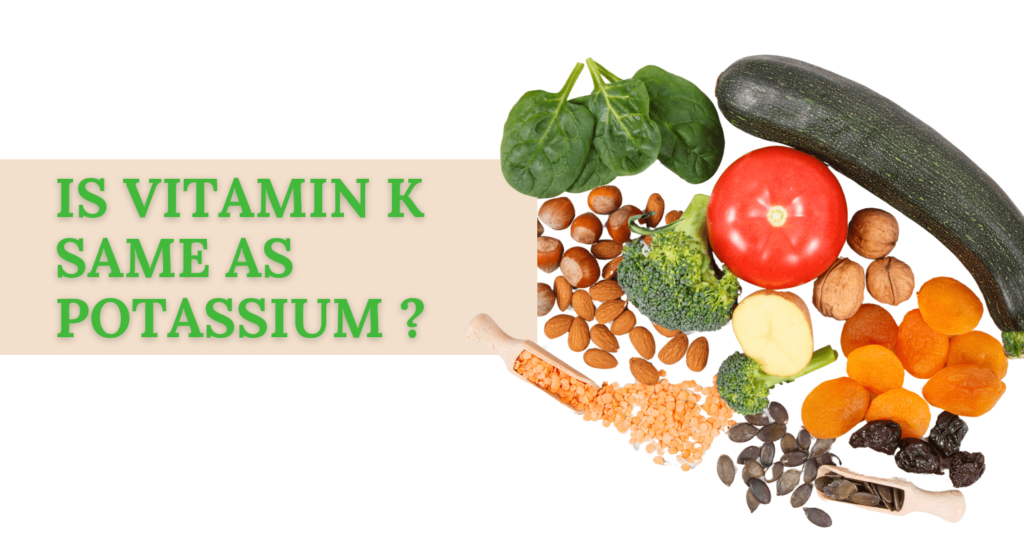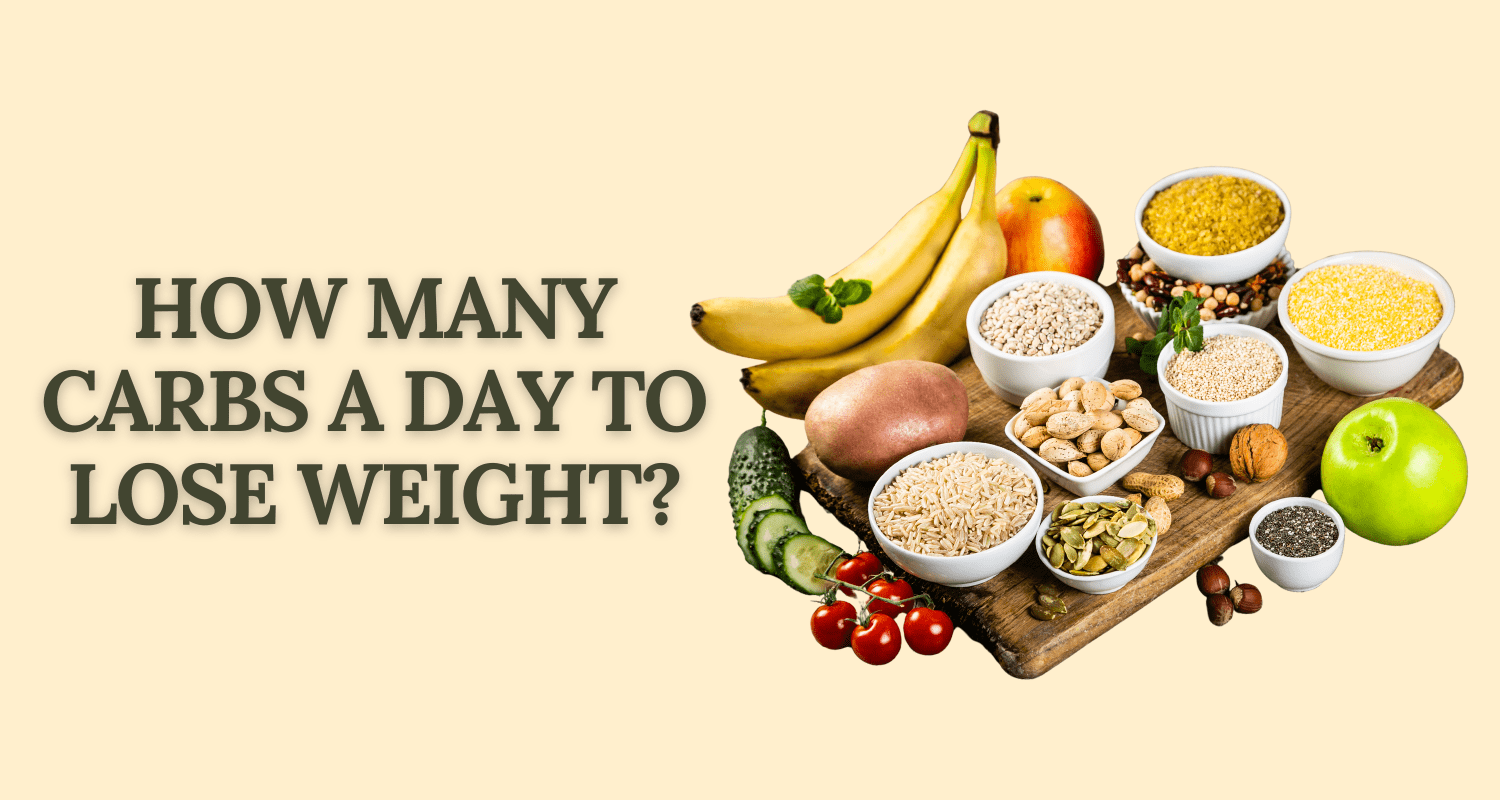Have you ever found yourself confused about the differences between vitamin K and potassium?
You’re not alone!
Vitamin K or potassium, both are crucial for our health, but they have different jobs.
They share some things in common, but they’re not the same thing. Knowing how they differ is key to staying healthy.
In this article, we’ll uncover the truth behind whether is vitamin K the same as potassium or if they have unique functions that make them essential in their own ways. We’ll also explore their benefits and food sources.
Let’s delve into whether is vitamin K the same as potassium.
Key Takeaways:
- Is vitamin K the same as potassium? No, both are different, Vitamin K and potassium are essential micronutrients with distinct functions in the body.
- Vitamin K is important for blood clotting and bone production, while potassium helps regulate electrolyte balance, blood pressure, and muscle movement.
- Vitamin K is a group of fat-soluble vitamins, while potassium is a mineral.
- Both vitamin K and potassium offer various health benefits, including supporting heart health, bone health, and overall well-being.
- While generally safe, individuals with specific conditions or taking certain medications may need to monitor their intake of vitamin K and potassium.
Understanding Vitamin K and Its Functions
Vitamin K is vital for the body and has key roles. It’s crucial for blood clotting, which is important for healing wounds. It’s also needed to stop too much bleeding. Doctors use it to reverse the effects of blood thinners.
It’s also good for bones. Vitamin K helps make proteins needed for bone strength. This means it can help fight osteoporosis and reduce fractures.
Studies show vitamin K might also help the heart and brain. Some found it lowers heart disease risks. Others see it might boost brain health.
To get enough vitamin K, eat a varied diet with lots of this vitamin. Good sources are green veggies like kale and spinach. Also, oils and fruits help, plus fermented natto.
Knowing about vitamin K can help us eat better for our health. Adding vitamin K foods to meals can help in many ways. It supports blood clotting, bone strength, and health for the heart and brain.
Exploring Potassium and Its Functions
Potassium is a vital mineral that supports many body functions. It helps balance the fluids inside and outside cells (potassium functions). This mineral also aids in muscle and heart activity, ensuring they work properly (role of potassium). It is key to healthy nerve function and helps keep blood pressure in check (potassium benefits).
One key function of potassium is balancing fluids in the body. It does this by controlling water levels in and around cells. This process is vital for cell and organ health (potassium functions).
Kits job in muscle function, especially the heart, is crucial. It ensures the heartbeats properly and muscles work as they should. This includes muscles throughout the body (role of potassium).
Kits role in nerve function is also significant. It helps messages move between the brain, spine, and body smoothly. This is essential for normal body functions (role of potassium).
In keeping blood pressure healthy, potassium works with sodium. They balance blood pressure, preventing it from getting too high. Besides eating potassium-rich foods, lowering sodium is key for a healthy heart (potassium benefits).
Potassium is crucial for many body processes. It helps with fluid balance, muscle and nerve function, and keeps blood pressure normal. Adding foods rich in potassium to your meals is a smart choice.
Differences Between Vitamin K and Potassium
Is vitamin K the same as potassium? Vitamin K and potassium are key nutrients, but they work in different ways. Vitamin K dissolves in fat and potassium is a mineral. They have unique roles in our bodies.
Vitamin K
- Vitamin K helps blood to clot.
- It’s also crucial for keeping our bones strong.
Potassium
- Potassium helps balance fluid in our bodies.
- Our muscles need it to work well.
- It’s vital for a healthy heart.
It’s important not to mix up these nutrients because they serve very different purposes.
Vitamin K specializes in making sure our blood clots and our bones stay healthy. Potassium, on the other hand, works to keep our fluids, muscles, and hearts in check.
The foods that give us these nutrients are also quite different. Vitamin K comes from green leafy veggies, oils, some fruits, and fermented foods such as natto. In contrast, potassium is in lots of foods like fruits, veggies, nuts, dairy, and seeds.
Knowing how vitamin K and potassium differ is vital for a healthy diet. It ensures we get enough of both nutrients.
The Similarities of Vitamin K and Potassium
Vitamin K and potassium may do different jobs inside us, but they share key traits. Both are vital for good health and help our bodies work well.
Vitamin K helps with blood clotting and keeps our bones strong. Potassium, on the other hand, keeps our fluids balanced, helps our muscles move, and supports our hearts. Even though they have separate roles, they are both crucial for our health.
These nutrients can be found in a wide range of foods, showing another similarity. For example, leafy greens like spinach and kale give us lots of vitamin K and potassium. You can also get them from fruits, whole grains, and certain oils. Adding these items to your meals is a great way to meet your nutritional needs.
But, it’s good to recognize they work differently inside us. Vitamin K is key for blood and bones, while potassium focuses on fluid balance and our muscles. Their roles are unique, even if we find them in the same foods.
Similarities Between Vitamin K and Potassium:
- Both are essential nutrients for maintaining overall health.
- They play vital roles in various bodily functions.
- Leafy green vegetables, fruits, and whole grains are rich sources of both vitamin K and potassium.
Knowing how vitamin K and potassium work can help you eat better. A balanced diet of these nutrient-rich foods aids your health. This mix supports your well-being.
Sources of Vitamin K
Vitamin K is key for our health and is found in many foods we eat. It comes from what we eat and what our bodies make. Eating foods rich in vitamin K is good to keep a healthy level of this nutrient.
Dietary Sources
Many foods have vitamin K. Green veggies like kale, spinach, and broccoli are packed with it. They not only give us much-needed nutrients but also add taste and variety to our meals.
Fats like soybean, canola, and olive oils are rich in vitamin K too. These are often used in cooking, so vitamin K can easily be part of your meals.
Don’t forget about certain fruits like prunes, blueberries, and kiwis. They also offer vitamin K. Adding these fruits makes your diet more diverse and adds natural sweetness.
Natto, a fermented soybean dish from Japan, is another great source. It’s not just vitamin K. It also has probiotics that help with our digestion.
Optimal Absorption
Vitamin K is absorbed better with fats. Adding sources of healthy fats to your meals is beneficial. For instance, using olive oil on your leafy green salad or having avocado with vegetables boosts vitamin K’s effects.
Adding these vitamin K sources to your meals is essential. They help you get enough of this vital nutrient for good health and well-being.
Sources of Potassium
Potassium is a needed nutrient available in various foods, both from plants and animals. It’s key to have potassium-rich foods in your diet to stay healthy and support body functions.
Fruits
- Fruits like bananas, citrus fruits (such as oranges and grapefruits), and avocados are packed with potassium. They also give needed vitamins, minerals, and fiber.
Vegetables
- Leafy greens such as spinach and kale are full of essential nutrients and potassium. Other vegetables high in potassium are potatoes, sweet potatoes, and tomatoes.
Legumes
- Beans, lentils, and chickpeas are also great sources of potassium. They offer fiber and protein, boosting the nutrition in your meals.
Nuts and Seeds
- Almonds, pistachios, and sunflower seeds are tasty and rich in potassium. They are also packed with healthy fats, protein, and key nutrients.
Dairy Products
- Milk and yogurt belong to dairy products that hold potassium. They are full of calcium and other nutrients important for strong bones and teeth.
Foods’ potassium levels can differ, showing the need for a diverse diet. Mixing various potassium-rich foods in your meals can enhance your health and well-being.
The Importance of Adequate Vitamin K Intake
It’s vital to get enough vitamin K for your blood to clot well and to keep your bones strong. This fat-soluble vitamin is key in the blood’s coagulation process. It ensures blood clots when it should, thanks to the unique proteins it activates.
But vitamin K is not just about clotting blood. It also helps build proteins for bone health. This supports keeping our bones strong. Taking in enough vitamin K lowers the chance of fractures and osteoporosis, especially as we get older.
Without enough vitamin K, we might bleed too much and have weaker bones. A vitamin K shortage is unusual, but some people are at higher risk. This includes those with trouble absorbing fat or certain medical issues. For them, watching their vitamin K intake is extra important.
Vitamin K does even more than help with blood clots and bones. New studies show it might be good for the heart and brain too. Getting the right amount can perhaps lower heart disease risk and boost brain power.
To get plenty of vitamin K, eat a mix of foods rich in it. Leafy greens like kale, spinach, and broccoli are top sources. Vegetable oils like soybean and canola also have vitamin K. Plus, fruits like kiwi and avocado can help you reach your vitamin K goals.
Benefits of Vitamin K:
- Promotes proper blood clotting
- Supports bone health and reduces the risk of fractures
- May have potential cardiovascular benefits
- May improve cognitive function
Making sure you eat enough vitamin K is crucial for a healthy life. But for specific advice, it’s wise to talk to a health expert and it is also essential to understand types of vitamin K1 vs K2. They can guide you, especially if you have any health conditions or dietary needs.
The Importance of Adequate Potassium Intake
Getting enough potassium is key for keeping fluid balance, muscles strong, and the heart fit. This essential mineral works wonders for our health.
Importance of Potassium:
Potassium is a must for keeping our body fluids in check. It acts as an electrolyte, controlling fluid movement in and out of cells. This keeps us hydrated and our systems running smoothly.
Potassium also powers our muscles, including the heart. It helps muscles work and rest, keeping the heart’s rhythm steady. This lowers the chance of heartbeats going off track.
Benefits of Potassium:
Kickstarting potassium benefits more than just fluids and muscles. Eating enough potassium-rich foods helps our overall health in many ways.
For example, it can help keep our blood pressure in check. Potassium fights sodium’s efforts to raise blood pressure. A good potassium-sodium balance means a healthier heart and lower hypertension risks.
Potassium is also a hero for our bones. It maintains bone strength and density, which is key in dodging osteoporosis. So, munching on potassium foods is a win for bone health.
Meeting Recommended Potassium Intake:
Eating a mix of potassium sources is crucial. Think fruits like bananas, oranges, and avocados. Veggies such as spinach, sweet potatoes, and tomatoes also do the trick.
Don’t forget about dairy, legumes, nuts, and seeds. They can boost your potassium levels too. Adding these to your meals ensures you get enough potassium every day.
But, for those with kidney issues, watching potassium levels is vital. Too much can be harmful. Always check with a doctor for the best potassium plan.
With the right foods, you can keep your fluid balance, muscles, and heart in top shape. Potassium is here to help us feel our best.
Conclusion
In conclusion, is vitamin K the same as potassium, vitamin K and potassium are vital for health. Vitamin K helps with blood clotting and keeps our bones strong. Potassium maintains fluid balance, aids muscles, and is good for the heart.
Even though both nutrients are key to good health, they work differently in our bodies. Vitamin K dissolves in fats, but potassium is a mineral. Their roles and where we find them vary.
Eating a balanced diet is the best way to get enough vitamin K and potassium. Fill your plate with veggies, oils, and fruits for vitamin K. For potassium, enjoy bananas, citrus, and spuds.
FAQs
Is vitamin K the same as potassium?
No, vitamin K versus potassium is different. Vitamin K is essential for blood clotting, while potassium is an electrolyte crucial for nerve and muscle function.
Is there a difference between vitamin K and potassium?
Yes, vitamin K is a fat-soluble vitamin, vital for blood clotting, while potassium is a mineral important for nerve and muscle function and regulating fluid balance.
What is another name for vitamin K?
Phylloquinone and menaquinone are other names for vitamin K.
Do bananas have vitamin K?
Yes, bananas contain a small amount of vitamin K, contributing to overall intake.
What is the best form of potassium?
Potassium citrate or potassium chloride are commonly used forms in supplements, but a balanced diet rich in fruits and vegetables is the best source of potassium.
Disclaimer: This content, including advice, provides generic information only. It is not a substitute for a qualified medical opinion. Always consult a specialist or your doctor for more information. Nutrition Cult does not claim responsibility for this information.




